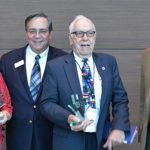HONOLULU—Innovative missions today demand contextualized ministries shaped by local churches—not one-size-fits-all imported strategies implemented by professionals, a missions professor from Texas and a pastor from South Australia told a focus group at the Baptist World Congress.
Mike Stroope, missions professor at Baylor University’s Truett Theological Seminary, and John Beasy, senior pastor of Enfield Baptist Church in Adelaide, Australia, and national president of the Baptist Union of Australia, led a focus group during the 20th Congress of the Baptist World Alliance.
Stroope critiqued two assumptions “that made sense at one time but are no longer viable answers” for missional Christians—that globalized strategies work in all cultures and that professional experts are best equipped to implement those strategies.
“We want to find the one method, the one strategy or the single solution that will answer every situation, for every location,” Stroope said. “We want to find the silver bullet or discover the mega-strategy that will work whether we are in Los Angeles, Munich, Nairobi or Hong Kong.
“Behind this tendency to globalize answers is the modern belief in the potency of reason to create solutions for every problem and then the tendency, mainly by the West, to apply those solutions universally. The modern missionary movement was party to transmitting global answers when it came to methods and strategies. We reasoned that if a person had success with a certain method in one place, he or she could universalize the principles and tactics of that method and apply them elsewhere—anywhere.”
In the process, missionaries from the West produced uniform systems and strategies that often violated local contexts, he said.
“Mission history teaches us that whenever the church in one locale forces its ways of church and witness on a church in another locale, the results are damaging and sad,” Stroope said. “For persons from the West or the East to promote, finance or force globalized methods, strategies or solutions on another is simply a form of cultural or ecclesiastical imperialism.”
Instead of relying on solutions imposed from the outside, local churches should seek to discover what God would lead them to do in their local contexts, he insisted.
“As Baptists, we believe the church is to be found primarily and visibly in local gatherings of believers. … Autonomy is more than an issue of polity and governance, but also a matter of appropriate and viable witness and service,” Stroope said.
Sign up for our weekly edition and get all our headlines in your inbox on Thursdays
Furthermore, reliance on professionals essentially gave lay people permission to disengage from missions and ministry and to delegate those duties to credentialed experts, he asserted.
“So, in what direction do we, as Baptists, need to turn our faces? Instead of globalized solutions, strategies or methods that offer only a monotone, singular answer, we need to promote a multitude of answers found in a variety of local strategies and methods,” he said. “Instead of professionalized experts that restrict knowledge of and participation in the mission of God to only a few, we need to highlight the biblical teaching of soul competency and the priesthood of all believers.”
Enfield Baptist Church, a South Australian congregation in a low socio-economic community, determined to offer holistic ministries focused on restoration—both in its local context and in partnership with churches in Vietnam and Bangladesh, Beasy said.
That vision led the church to launch LifeWell—a comprehensive program focused on “restorative care to move people toward wholeness through access to a range of services that provide personal care and support and promote personal wellbeing,” Beasy said.
The ministry offers services ranging from massage and hair care for the poor to support groups for people dealing with various crises, as well as nutrition education, fitness programs and spiritual mentoring.
“We believe the foundation for innovative, creative mission is God’s big agenda—to restore all things under Christ,” he said.














We seek to connect God’s story and God’s people around the world. To learn more about God’s story, click here.
Send comments and feedback to Eric Black, our editor. For comments to be published, please specify “letter to the editor.” Maximum length for publication is 300 words.